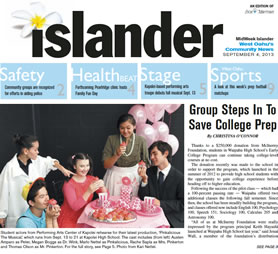Group Steps In To Save College Prep
Thanks to a $250,000 donation from McInerny Foundation, students in Waipahu High School’s Early College Program can continue taking college-level courses at no cost.
The donation recently was made to the school in order to support the program, which launched in the summer of 2012 to provide high school students with the opportunity to gain college experience before heading off to higher education.
Following the success of the pilot class – which had a 100-percent passing rate – Waipahu offered two additional classes the following fall semester. Since then, the school has been steadily building the program, and classes offered now include English 100, Psychology 100, Speech 151, Sociology 100, Calculus 205 and Astronomy 100.
“All of us at McInerny Foundation were really impressed by the program principal Keith Hayashi launched at Waipahu High School last year,” said Jenai Wall, a member of the foundation’s distribution committee. “We were excited by the participation level, by the stories of students who had never previously thought college was a possibility, and by the demand and interest this pilot program generated on campus. That more than 300 students hoped to participate in Early College was especially exciting to us, and we wanted to make sure their dreams were not hampered by a lack of funds.”
McInerny Foundation is a trustee of Bank of Hawaii that grants donations to charitable organizations within the state, with a particular focus on education and social services.
All courses offered in Early College take place on Waipahu’s campus and are led by instructors from the school’s collegiate partners on the project, Leeward Community College and University of Hawaii-West Oahu.
“One of the main things is that we want to ensure that the rigor of the class is the same level of rigor that they would expect out of college students,” Hayashi said.
Overall, according to Hayashi, the students have been performing well. And while some students have struggled with the advanced material, there has been much enthusiasm for the program.
“Some of the comments from students have been that they like the challenge, as well as the expectations,” he said. “They are considered students in college, so they really need to perform to that level. Because the expectation is there, they work to meet that expectation.”
Through some of the classes, the students can accumulate credits for college. This is particularly important for a school where 50 percent of students qualify for federally reduced lunch. And according to Hayashi, many of the aspiring college students at Waipahu will be the first in their families to attend college.
“The foundation supports us not only in the classes themselves, but I think it translates into the students believing in themselves and being willing to take risks for college success,” he noted.
“Not only does it mean that we can offer eight to 10 classes a semester and give these students the opportunity to participate in them, but they also gain confidence that they can be successful, which is huge for them.
“Hopefully we can really continue to grow this at our school,” he said.
The program, Hayashi said, complements Waipahu High’s larger curriculum, which supports college and career readiness through features that include its smaller learning communities that help students align their interests with their courses of study.
Apart from the Early College Program, Waipahu students have been making other major strides when it comes to higher education. Collectively, the class of 2013 amassed more than $10 million in merit-based scholarships.
McInerny Foundation hopes that its donation will help not only the school, but also the community at large.
“We are confident that with McInerny funding, this program would have a positive long-term impact on the Waipahu community, and we also hope this success will inspire other schools to follow the lead of Waipahu High School, its principals and its students,” Wall said.






